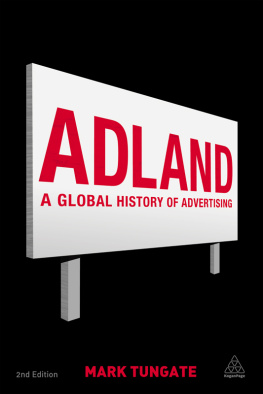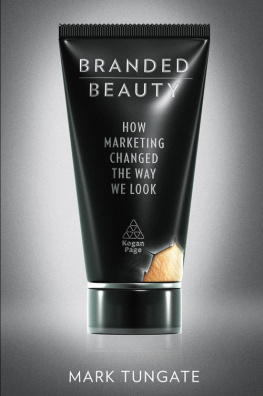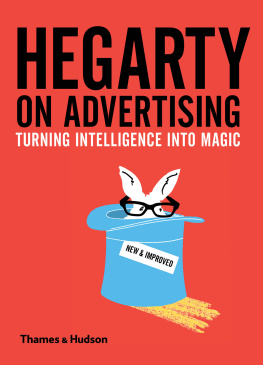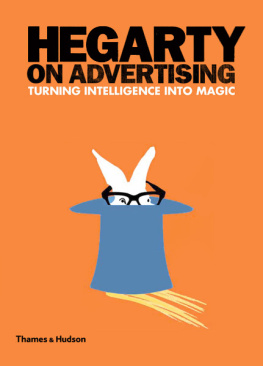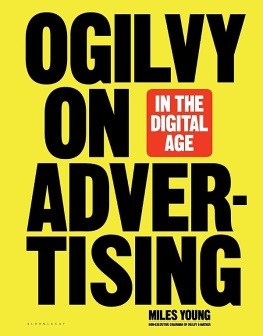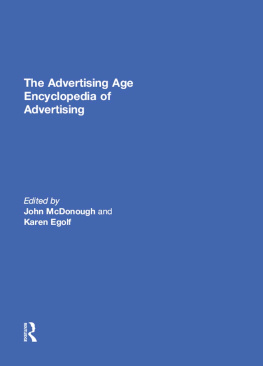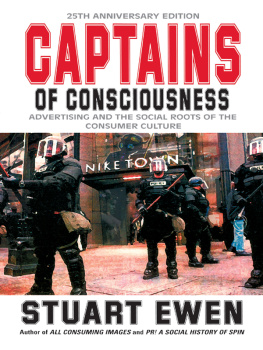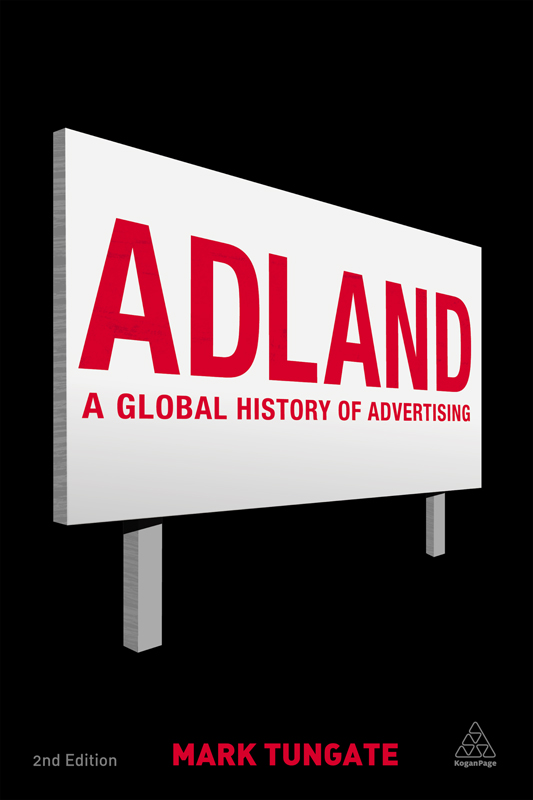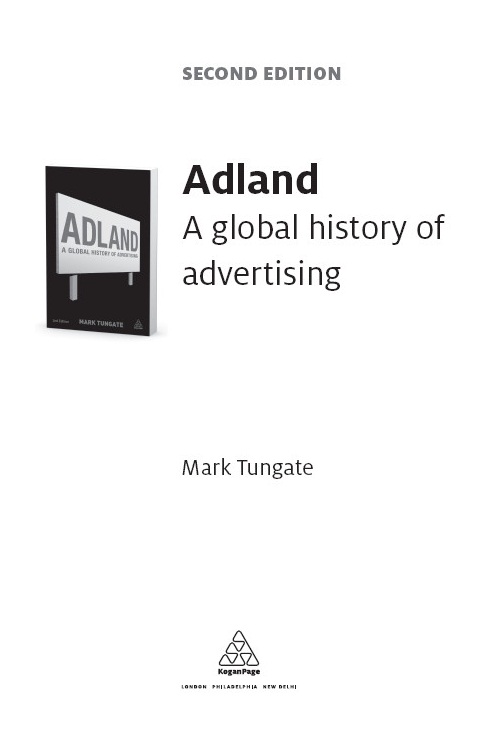Note on the Ebook Edition
For an optimal reading experience, please view largetables and figures in landscape mode. |
This ebook published in 2013 by
Kogan Page Limited
120 Pentonville Road
London N1 9JN
UK
www.koganpage.com
Mark Tungate 2007, 2013
E-ISBN 978 0 7494 6432 5
CONTENTS
W hen this book first came out, in 2007, I was surprised by how many people said something along the lines of: Thats all very well but what happens next? Whats the future of advertising?
While I devote a short chapter to the future of the industry, for me the response is in the subtitle: A Global History of Advertising. This, then, is a history book. Pure and simple.
Theres a problem, however, which is that history doesnt stand still. When Adland was published, Facebook was barely on the radar (it had been opened to the general public a year earlier). The iPhone came out in June that year, after I had finished writing. The iPad was still three years away. All these things and more would radically change the structure of the industry, accelerating an audience fragmentation process that had begun with satellite TV and continued with the growth of the internet.
In other words, just sticking your product on a major TV channel wasnt necessarily the best way of plugging it any more. Your public might be elsewhere, enjoying a new kind of entertainment on a different sort of screen. Confusing times for advertising agencies. Not only that, but the rate at which history is made seems to have accelerated. A new app can rocket from obscurity to worldwide renown in a matter of weeks. Advertising people often tell me they feel as though theyre constantly running to keep up.
I address some of these problems in a revised chapter about the future, as well as in the short introduction. Other chapters have been adjusted and updated here and there, but largely left intact.
I fully admit that my real passion is for the history of the industry. During the original writing process, I took great pleasure in evoking the lives and times of people such as Leo Burnett, Bill Bernbach and David Ogilvy. I imagined walking into Ogilvys office, perhaps to find him testily tapping a pencil on his desk as he examined my attempts to write a pithy phrase. And I was delighted to interview people who had experienced just that.
I also relished listening to experienced ad men and women as they recounted their early careers and recent successes. Its not every day you get to sit down with Alan Parker and listen to his stories about the London adland of the 1970s. Or visit the Greenwich Village apartment of George Lois and hear about his days at Bernbachs DDB.
If you already know these people, youll realize why researching this book was such a blast.
And if youve never met them before well, youre in for a treat.
Authors note
As far as contemporary agencies are concerned, all job titles were correct at the time of writing. If I have missed out any advertising luminaries due to lack of space or simple misjudgement, I apologize. Your egos will recover, Im sure.
Advertising is show business
T he adman sits on the glassed-in terrace of a Parisian caf and gazes out over the rapidly darkening square. People are hurrying home with baguettes and bottles of wine; maybe even some of the pungent cheese he loves. In the caf there is chatter and warmth as apritifs are served and the city tunes up for another evening of pleasure an act it has been polishing for centuries. The spindly old streetlamps across the street have just come on, as have the tiny spotlights above an advertising billboard. It exhorts him to buy a new Peugeot.
The adman is pensive. The billboard he is staring at seems to belong to a bygone era. In just a few short years, the landscape of his industry has shifted around him. Not so long ago, the 1960s advertising execs depicted in the hit TV show Mad Men would have slotted in to his agency without anybody noticing. But not now. Today theyd look out of place quicker than you can say anachronism.
The world has gone digital. A creative idea the seed of any good advertising campaign can now be expressed in myriad ways, across numerous media platforms. Posters still exist, certainly. So do newspapers, magazines, TV and radio. But there are also apps and online videos and social networks and all the rest of it. Clients are demanding more for less, and their procurement people are screwing the lid down tight on budgets. Greedy management consultants are nibbling away at his territory.
The adman isnt disheartened by any of this. Faintly anxious, perhaps. Theres a lot to think about. But its exciting. In the Mad Men era there were a finite number of solutions to any advertising problem. But now the answer can come from anywhere. It might be a gadget, an event, an art installation. Hed design a car for a client if he had to. Theres a reason why the annual advertising festival in Cannes is now called the Festival of Creativity .
Thats the difference, he thinks, between his agency and a management consultancy. His people actually create things. They make them. And the things they make create success for their clients.
The adman smiles and sips his glass of Bordeaux. Despite everything, he thinks, an advertising agency remains a very cool place to work.
Servants and masters
Sir Martin Sorrell, the chairman of marketing group WPP, commented during an interview that advertising is considered an extension of show business. Agencies are by no means court jesters, but the industrys glitz does tend to detract from its vital contribution to the global economy. It may also explain why many agencies have struggled to raise their status from suppliers to strategic advisers in the eyes of their clients.
One of the things that surprised me most during the research for this book was the sheer power that clients wield over their agencies. I was left with the impression that an advertising executive will stop at nothing to gain or retain a client. Certainly, when a client summons them they do not hesitate to cancel a meeting with a journalist, even if he has arranged to fly thousands of miles to interview them. This happened to me not once, but several times. The fashion industry, the subject of my last book, has a reputation for rudeness and inaccessibility. But nobody in the fashion business treated me with the lack of courtesy afforded me by some advertising agencies. And the client always got the blame. Perhaps this is only to be expected in a business where the clients hold all the cards. As one agency boss said, We know were only three phone calls away from disaster.
We consumers dont have the luxury of worrying about where the power lies in the partnership. We only know that, between them, advertising agencies and their clients have an immense impact on our lives. As digital media challenge the ability of TV to disseminate advertising effectively, brands are forcing their messages onto every blank space, into every crack in the urban landscape. More than wallpaper, advertising is the stuff that surrounds us.
Yet, even today, there is debate about how much of this advertising is really effective. Retail tycoon John Wanamaker stated over a century ago that half of all advertising works, but nobody knows which half. (The quote is occasionally attributed to adland legend David Ogilvy, which seems unlikely, for reasons well discover later.) In 2006, a book called What Stick s: Why Most Advertising Fails and How to Guarantee Yours Succeeds , by Rex Briggs and Greg Stuart, suggested that 37 per cent of advertising budgets are wasted.

